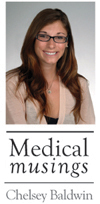|
Editor's note: Chelsey Baldwin of
Little River is a second-year
medical student. This column
follow the journey of her class in
becoming doctors.
 It's a
question I hear frequently,
particularly over breaks when
reunited with people from my
pre-medical school past: Do you
think medical school has changed
you? It's a
question I hear frequently,
particularly over breaks when
reunited with people from my
pre-medical school past: Do you
think medical school has changed
you?
I usually
joke back, "Gaw, after all the
tuition we pay, something better
have changed." Joking aside,
this question can be answered
rather simply: absolutely — just
as all experiences that are
beautiful, trying, enlightening
or prolonged cause modifications
in any person. Medical school,
containing all of the above
aspects, has caused quite
profound changes.
While the
most obvious of changes are
found in our shiny new medical
vernacular and improving patient
finesse, ease with discussions
of bowel movements and sexual
histories, the changes to one's
personality aren't so blatant.
However when these tweaks to
oneself do come to light, they
can be all the more startling
and leave you wondering: Who are
you and what has medical school
done with the person I used to
be?
My mother
used to describe me as cat-like:
Averse to being clung to, shying
away from displays of epic
emotion and affectionate only on
my own terms. I loathed crying,
did my best to avoid mother's
sappy episodes and took pride in
my ability to never let emotions
overwhelm me. And yet the demise
of this aspect of my personality
became evident as our final
lecture of the fall semester,
"Discovery of Insulin," was
drawing to its end.
As our
lecturer described the
miraculous restoration of health
in children with Diabetes
Mellitus Type 1 who were further
afflicted by the only treatment
known to prolong lifespan at the
time — starvation — tears began
to well in my eyes. He explained
that the discovery of insulin
was the first time that the
practice of medicine was more
than making a diagnosis, it was
curative. The talk was
absolutely beautiful, and it
struck me in such a way that my
tears began to pour.
First I
cried because I felt so horrible
for the children, then I cried
in relief for their liberation
from suffering. Then the source
of the waterfalls spilling down
my face changed to tears of
pride for I too would become a
part of a tradition of healers.
By the end I wasn't sure why I
was crying except that it felt
good. It had become a catharsis,
a chance to feel something more
than book pages between my
fingers. I embraced the emotion,
clung to its messy nature devoid
of poise. Minutes later, as I
wipe away the evidence of my
emotional outburst that only a
few years earlier would have
sent me running for the hills, I
smiled, pleased with myself. I
had felt something real, and
there was no shame in that.
Even when
I am able to leave my books and
notes behind, the changes
inflicted travel with me. Over
the winter break, I sought out
my favorite eatery in the Newark
airport, a yearly ritual of my
holiday season pilgrimage to
Cleveland. I ended up sitting
next to a young English
professor passing the time
before his flight by writing
poetry. He was clever and fun to
talk to. I giggled about my
encounter to my girlfriends
later on, a little shocked when
reminded of a previous boyfriend
I had broken up with soon after
the composition of a sappy love
poem. When had I become a
romantic? I explained to them
that I imagine the poet-crush
likely had shared the same
origins as the tears.
I
remember once being told that
college, not medical school, is
the time to find one's self. I
had copied the previous
statement down in a notebook,
intending to work the fact that
I was confident that I had
already found my "adult" self
into my interviews. Yet after a
year and half of medical school,
I have to respectfully disagree.
I've become an
emotion-embracing, poet adoring,
bodily-function-discussing
physician-in-training, a change
for which I completely, but not
begrudgingly, blame medical
school.
|



 It's a
question I hear frequently,
particularly over breaks when
reunited with people from my
pre-medical school past: Do you
think medical school has changed
you?
It's a
question I hear frequently,
particularly over breaks when
reunited with people from my
pre-medical school past: Do you
think medical school has changed
you?